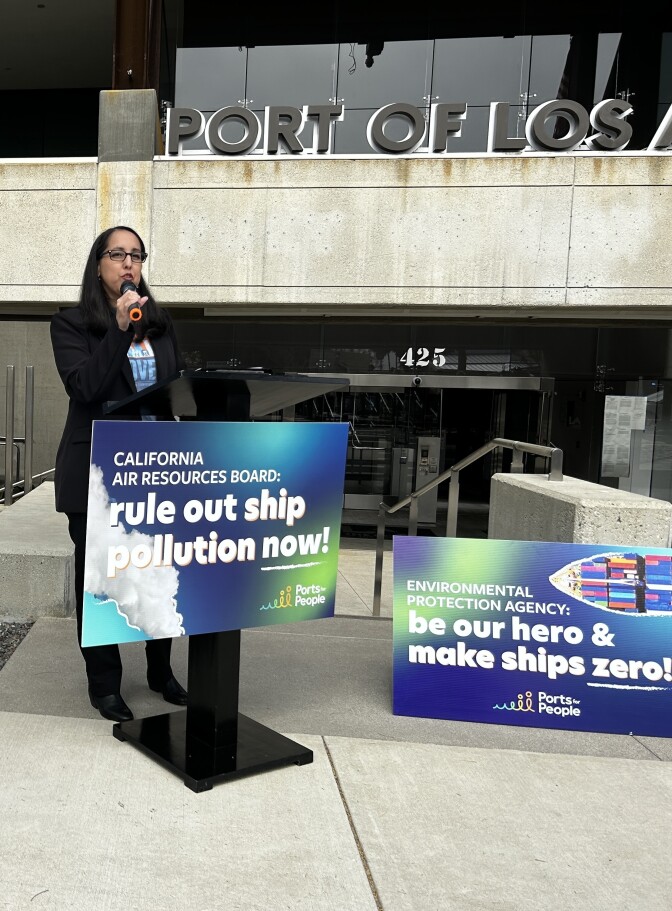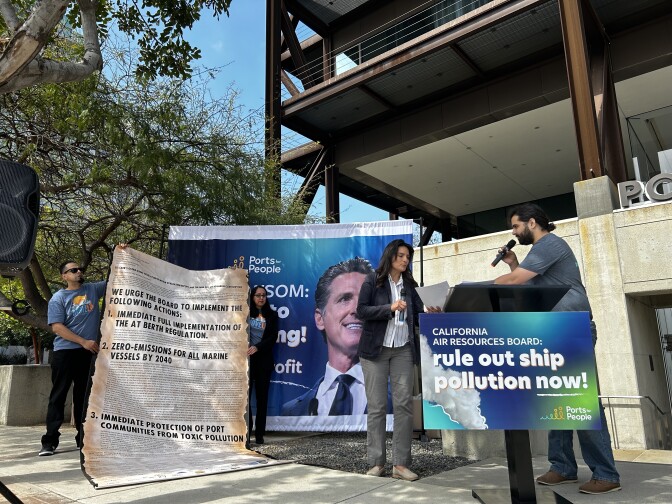This story is free to read because readers choose to support LAist. If you find value in independent local reporting, make a donation to power our newsroom today.
It’s Not Just Cars And Trucks: Concerns Rise On How Ships And Ports Are Damaging LA’s Air Quality

Cargo ships idling and other industry activities at the ports of Los Angeles and Long Beach spew more smog-forming and planet-heating pollution in one day than the 6 million cars on Southern California roads, according to the South Coast Air Quality Management District, which regulates air pollution in the Southland.
That’s why environmental justice activists held a rally Wednesday outside the Port of Los Angeles to call on federal, state and local leaders to more quickly clean up the ports and implement a rule that would help lower pollution from idling cargo ships.
A new “at-berth” rule, which is implemented by the California Air Resources Board, or CARB, the state’s air agency, was supposed to go into effect this year, but has been delayed due to bureaucratic holdups and pushback from the industry.
The original rule was enacted in 2007 and helped lower pollution from certain ocean-going vessels by 80 percent, according to CARB. However, greenhouse gas emissions have only gone up, rising more than 20% at both the ports of Los Angeles and Long Beach since 2005, according to port data.
Policies to improve health and air pollution
Activists are calling on the state to completely phase out the dirtiest ships by 2028 and develop a new regulation requiring all ships to be zero emissions by 2040.
“The delay in implementing these regulations is putting the health and lives of millions of Californians at risk,” said Marisa Garcia, who grew up beside freeways in southeast L.A. and is now an activist with nonprofit Move LA.
She said the technology exists to dramatically reduce health and planet-harming pollution at the ports, while creating good jobs for locals. She pointed to existing technologies such as battery storage, wind-assisted propulsion, and green hydrogen fuel cells.

Pollution from ocean-going ships and diesel trucks has led to port communities experiencing the highest levels of diesel pollution in California, according to state data.
Research has supported community members’ experiences of some of the highest rates of cancer, asthma and other health issues in the state. People who live in largely working-class Latino communities such as San Pedro, Wilmington, Carson, and West Long Beach have an average life expectancy up to eight years shorter than the average life expectancy in L.A. County while they're exposed to higher levels of air pollution.
Jan Victor Andasan grew up in west Long Beach and is now an activist with the group East Yard Communities for Environmental Justice. Their family moved from the Philippines to Long Beach nearly 30 years ago, when Andasan was a child.
“A year after living in West Long Beach, I would develop asthma,” Andasan said. “And that same year my brother would be born and he would be born breathing through a nebulizer.”
Ocean vessels spew outsize amounts of pollution
Nearly all of the world’s trade happens on the ocean by some 90,000 ships, according to nonprofit ocean conservation group Oceana. Almost all of those ships use some of the dirtiest fuel in the world, such as heavy fuel oil, producing carbon dioxide that contributes to more than 3% of the greenhouse gas emissions heating up the planet — roughly equal to California’s and Texas’ carbon emissions combined. Without guardrails, experts say the industry could reach 17% of global greenhouse gas emissions by 2050 as world trade expands.
Ricardo Pulido of Carson has been part of the environmental justice movement at the ports since the early 2000s and is board chair of one of the earliest environmental justice groups in the area, the Coalition For A Safe Environment.
He lost his daughter to a neurological disorder he believes is related to the air pollution they lived with.
“The doctors all say it could be genes, it could be hereditary, but then I started looking deeper,” Pulido said. “It could be charged by the air, but nobody wanted to actually say it out loud at that time.”
Pulido is now partnering with USC to study the relationship between air pollution and neurological issues.

New federal funding expected to be a big help
Martha Guzman, the Southwest region’s administrator for the federal Environmental Protection Agency, also attended the rally. The at-berth rule is currently awaiting approval from the agency, which is partially why it has not yet been implemented. She said after a public hearing on June 1, the process to roll out the at-berth policy will move more quickly.
“There's no doubt that [the ports] are an important emission source to be addressing,” Guzman said. “And there's no doubt that there's a federal role in that.”
She said $4 billion federal dollars from the Inflation Reduction Act allocated specifically for goods movement will help implement technologies needed to move more quickly to lower emissions at the ports.
“We've requested now for the public to tell us, ‘What are those investment needs?’” Guzman said. “We're going to be meeting with all stakeholders, the ship owners are a big part of this, and finding solutions in the heavy duty sector across the board — the locomotives, the trucks — is incredibly important to reducing emissions and so we're very much looking forward to having seen those investments take place here in communities like here in L.A.”









